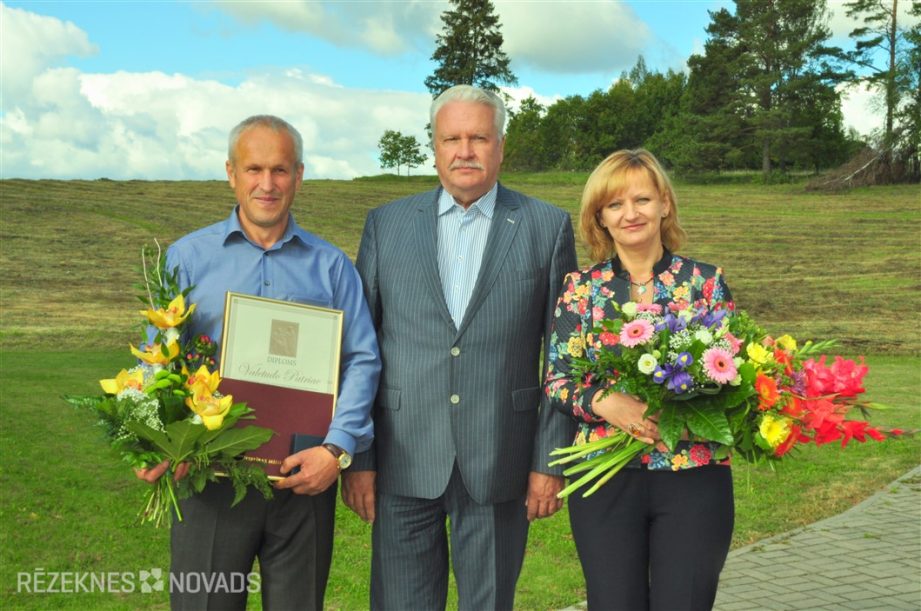ZS “lapegles” receives an award for the healthiest honey

Latvian doctors' association with Ministry of Agriculture and Health on Friday, September 16, Lendžu parish farm “lapegles” (owners Vitalijs and Sandra Sprudzs) gave the award “healthy Latvian diet”. The high award was received this year only by three organic farms in Latvia – “lapegles”, as well as “retains” from the municipality of Zilupes, and “wealth” from the municipality of Kraslava, Indras parish. The Latvian Agriculture Minister Janis Duklavs, President of Latvia's doctor of doctors Pēteris Apinis and the parliamentary secretary of the Ministry of Health Janis Trupovnieks gave the award.
The “healthy Latvian diet” award is grateful to Latvian farmers, fish farmers and food producers for achievements in the production of healthy food, the promotion of healthy diets and healthy lifestyles, the excellent food produced in Latvia, which is recommended by doctors in daily or special dietary nutrition. The prize, which is “Valetudo patriae” (health for the homeland), consists of the medals of the sculptor of the sculptor, on which the medical and health God Askeley is seen with his daughter Higieu, as well as a diploma created by the artist, Professor Guntar's wife.
“For human health and well-being only 15 to 20 percent are medical earned, the most important thing is to breathe clean air, drink clean water, eat good food and make much move,” said President of Latvia's doctor of doctors, Peter Apinis. “It is therefore important to find and summon those who grow or produce healthy food and think of green and organic farming.” In addition, as the Agriculture Minister Janis Duklavs pointed out, Latvia is one of the few countries where the soil is not corrupted to the extent that it could not be managed biologically: “environmentally friendly farming is how we can stand out on the whole European background.”
ZS “lapegles” was also performed BY Lendžu parish management head Voldemar Deksnis and Rēzekne municipality Member Anita Ludborža: “We have always known that we have the best farmers, the best entrepreneurs, the best craftsmen and the best Bitenieki. But when the Ministry of Riga appreciates it, although living far from us, it is a great achievement. We are proud of the busy, enterprising and helpful Sprua family. There must be special people to dirty bees, the world's biggest travellers and the most deprived insects. '
The work of “lapegles” in the beekeeping sector began in 1991. After seven years, his mother was taken over by his son, Vitaly Sprua, with his wife Sandra. In the same year, the family started to host biologically. Currently, there are more than 240 bee families under the supervision of owners. Both honey and beekeeping are produced – propolis and bee bread. Last year, approximately eight tonnes of honey were produced, most of which were exported to Denmark, Germany, Belgium, France and other European countries.
“Biologically, it is both hard and easy,” says Vitaly Spruill. “It is delighted that all the time can work in nature and with nature, without using pesticides and not letting insects on the head poison.” However, the problem is that non-organic nectarines should be avoided at all times, so that bees must be transported to biologically clean fields in other rural areas of Rezekne or in adjacent areas. 'As the beekeeper says, this year is not the most productive, as the spring was very dry, but then the summer rains began. “At least we had three to four hours of work in the bees before the rain began, and it was in the morning to evening.”
It is known that the honey is at the top of the list of healthy products, but it turns out that the beehives can also be treated: “bees” is the best medicine if the tick is biting, the tick must be removed immediately and a bee must be placed to take a drink. It has been verified that it can be saved from Laima's disease or tick encephalitis, ”the master says. In contrast, bee bread contains anti-cancer medicines and contains substances that help athletes to grow muscle mass.
Vitalijs Spruga says that the most demanding is the monoflora, or the honey from one type of plant, especially the golden beach and the perfume. In terms of future plans, the owners of “lapegles” intend to continue to develop in foreign markets, as well as to expand the premises for the storage of honey, which have now remained a narrow collection of 250 chaklo bees.
Madara Burtina,
Public relations specialist of the municipality of Rezekne